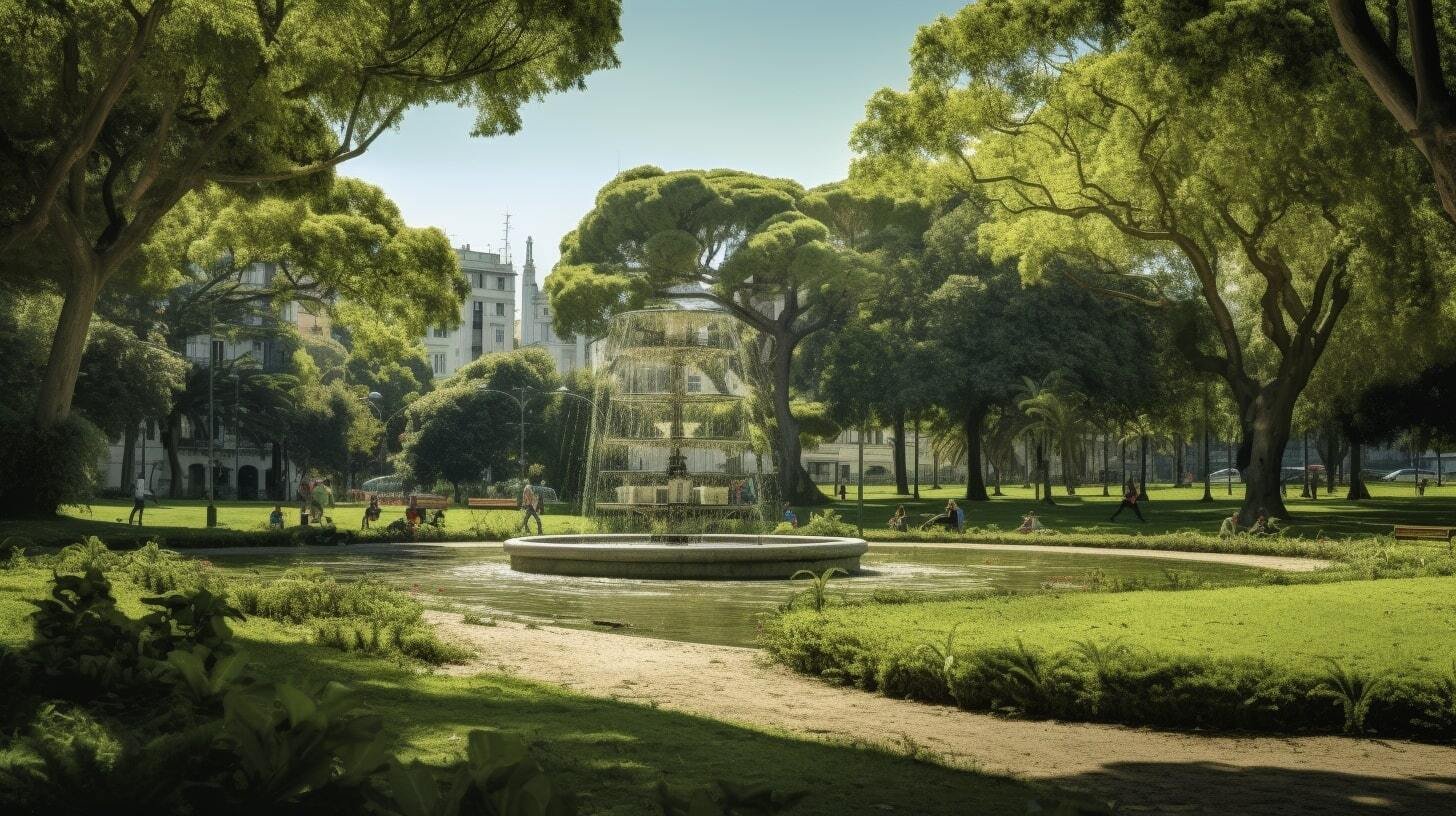Lisbon
Lisbon’s Environmental Renaissance: A Journey Through Urban Parks and Eco-Policies
Explore Lisbon’s remarkable transition to a green metropolis in our latest article. Discover how innovative policies, sustainable urban planning, and vibrant green spaces are reshaping Portugal’s capital into a model of urban environmental sustainability.

Nestled on the sun-drenched shores of the Iberian Peninsula, Lisbon – Portugal’s charismatic capital – has long enchanted visitors with its rich history, vibrant culture, and picturesque landscapes. From the winding alleys of Alfama to the grandeur of Belém, Lisbon tells a story that spans centuries. Yet, in recent years, this historical metropolis has embarked on a transformative journey, one that is painting its urban canvas green and redefining its legacy for the 21st century.
This article delves into Lisbon’s environmental renaissance, a pivotal shift towards sustainability that intertwines the beauty of its urban parks with groundbreaking eco-policies. As we traverse through Lisbon’s verdant spaces and innovative initiatives, we uncover how this city is not just preserving its past but also paving a path for a sustainable and resilient future. Join us on this journey to explore how Lisbon is revolutionizing its relationship with nature and reimagining urban living.
Lisbon’s Green Transformation: An Overview
As we delve into Lisbon’s green transformation, it becomes clear that this is not just a series of isolated initiatives, but a cohesive movement towards a more sustainable and inclusive urban environment. Central to this transformation has been a significant financial infusion from the European Investment Bank, amounting to €250 million. This strategic investment is more than just a financial commitment; it represents a profound belief in Lisbon’s potential to become a model of urban regeneration focused on social inclusion and climate change mitigation.
In parallel, the “Lisboa Solar” project, spearheaded by Mayor Carlos Moedas, illustrates a proactive approach to urban sustainability. This initiative forms a critical part of the 2022-2026 Great Options Plan, aiming to bolster electricity production for self-consumption in public and private buildings. It signifies a shift towards renewable energy and a departure from traditional energy paradigms, reflecting Lisbon’s dedication to a greener future.
Moreover, the LIFE UrbanGreeningPlans project, running from 2021 to 2023, echoes the European Union’s commitment to combat climate change. By mandating cities with over 20,000 inhabitants to create Urban Greening Plans, this project aims to reintegrate nature into urban areas, enhancing biodiversity and offering a tangible solution to the environmental challenges of our time.
Innovative Environmental Policies
Lisbon’s journey towards environmental excellence is marked by innovative policies that extend beyond traditional urban planning. A cornerstone of these initiatives is the strategic implementation of green roofs across the city. These living infrastructures not only enhance the aesthetic appeal of the urban landscape but also provide substantial economic and environmental benefits. Studies have shown that in Lisbon, the potential economic gain from green roofs ranges between 71 and 506 euros per square meter, highlighting their viability in highly urbanized areas.
The year 2020 marked a significant milestone for Lisbon, as it was distinguished as the European Green Capital. This honor was not merely a recognition of the city’s green spaces but an acknowledgment of Lisbon’s comprehensive and inspirational approach to sustainability, especially notable given its journey began during a period of economic hardship. The title served as a testament to Lisbon’s resilience and commitment to creating a sustainable future.
This commitment is further evident in the LIFE LUNGS project, which aims to fortify Lisbon’s resilience against climate change. By promoting green infrastructure and ecosystem services, the project aligns with the municipal climate adaptation strategy, targeting efficient water use and the development of zero rainwater waste urban systems. Such initiatives underscore Lisbon’s proactive stance in addressing environmental challenges through innovative policy-making.
Urban Parks: Lungs of the City
The true gems in Lisbon’s environmental crown are its urban parks, serving as green lungs amidst the bustling cityscape. These verdant havens are not just spaces for leisure and relaxation; they are integral to the city’s ecological and social fabric. Take, for example, the Jardim da Estrela and Jardim do Príncipe Real. Laid out in 1842, Jardim da Estrela retains its romantic ambiance, offering a peaceful retreat for people of all ages. Jardim do Príncipe Real, with its captivating charm, provides a serene oasis in the heart of the city.
Public perception of these parks underscores their value to Lisbon’s residents. Green and tranquil, these spaces are cherished for their ability to offer respite from urban life, though there is a desire for regular maintenance and the addition of leisure activities. This feedback from the community highlights the importance of not only preserving these spaces but also enhancing them to meet the evolving needs of the populace.
These parks are more than just picturesque spots; they are vital components of the city’s environmental strategy. By offering natural cooling and improving air quality, they contribute significantly to the health and well-being of Lisbon’s residents. In a broader sense, these urban parks exemplify Lisbon’s commitment to integrating nature into its urban development plans, ensuring that green spaces remain a defining feature of the city’s landscape.
Green Infrastructure and Urban Planning
Lisbon’s approach to green infrastructure and urban planning is a testament to its vision of a sustainable future. One of the standout initiatives in this regard is the LIFE LUNGS project, aimed at increasing the city’s resilience to climate change. This project is a key component of Lisbon’s municipal climate adaptation strategy, focusing on enhancing green infrastructure and promoting ecosystem services. By targeting efficient water use and developing systems that aim for zero rainwater waste, the project exemplifies Lisbon’s proactive and innovative approach to environmental challenges.
In addition to specific projects, Lisbon’s overall strategy for urban planning also reflects a deep commitment to environmental justice and sustainability. The city’s efforts to increase vegetation cover, as examined in studies spanning a decade (2010-2020), have focused on expanding public green areas, street trees, and urban green infrastructure. This not only improves the aesthetic appeal of the city but also has profound health benefits, particularly in combatting heat-related mortality among vulnerable populations like the elderly.
The integration of nature into urban planning is not just about creating green spaces; it’s about reimagining the cityscape as a harmonious blend of urban and natural elements. Lisbon’s initiatives in this realm demonstrate a forward-thinking approach to urban development, one that values environmental sustainability as much as economic and social growth.
“Lisbon’s ‘2030 measures for 2030’ initiative encapsulates a city-wide movement towards sustainability, where every sector plays a part in the green transformation.”
Future Directions and Sustainable Goals
As Lisbon looks to the future, its commitment to sustainability and environmental resilience remains steadfast. The city’s ambitious “2030 measures for 2030” initiative encapsulates this commitment. This forward-looking plan includes a range of goals, such as eliminating the use of single-use plastics, installing solar energy systems across the city, and providing sustainable mobility solutions. These actions not only address immediate environmental concerns but also set a long-term vision for a sustainable urban ecosystem.
The commitment to these goals is not limited to governmental initiatives alone. Over 200 institutions, businesses, and public bodies in Lisbon have pledged to implement concrete actions to realize these measures. This collective effort underscores a city-wide movement towards sustainability, where every sector plays a part in the green transformation.
Charting the Future: Lisbon’s Blueprint for Urban Sustainability
As Lisbon continues to evolve, its journey offers valuable lessons for cities worldwide. The integration of green spaces, the adoption of innovative environmental policies, and the commitment to sustainable urban planning serve as a blueprint for others to follow. Lisbon’s environmental renaissance is more than a local endeavor; it’s a model for urban sustainability that resonates globally.
Lisbon’s journey from a historic metropolis to a leader in urban sustainability is a narrative of transformation, resilience, and forward-thinking. The city’s environmental renaissance, marked by the integration of lush urban parks, innovative green policies, and a commitment to sustainable urban planning, sets a benchmark for cities globally. Lisbon’s story is a testament to the power of vision and collective action in shaping a sustainable future.
As we reflect on Lisbon’s green initiatives, from the LIFE LUNGS project to the “2030 measures for 2030”, it becomes evident that the path to sustainability is multifaceted. It requires not only the dedication of policymakers and urban planners but also the active involvement of the community and private sectors. Lisbon’s success illustrates that when a city unites in pursuit of a greener future, the possibilities are boundless.
In conclusion, Lisbon’s environmental renaissance is not just about creating green spaces or implementing eco-friendly policies. It’s about reimagining the essence of urban living, where nature and city life coexist in harmony. As Lisbon continues to evolve and inspire, it stands as a beacon of hope and a guidepost for sustainable urban development in the 21st century.
Lisbon
The Cost of Living in Lisbon: A Deep Dive into the City’s Housing Market Challenges
Facing a Housing Meltdown: Inside Lisbon’s Struggle with Skyrocketing Costs. Dive into the heart of the crisis and the urgent quest for solutions in one of Europe’s most captivating capitals.

Lisbon’s Escalating Housing Crisis
Lisbon, a city celebrated for its cultural heritage and vibrant lifestyle, now grapples with a mounting housing crisis. In 2023, Lisbon’s streets echoed with protests as residents voiced their frustrations against skyrocketing rents and house prices fueled by high inflation. This surge in living costs is reshaping the city’s landscape, posing profound challenges for its residents.
This article explores Lisbon’s housing market complexities, including its driving forces and government’s efforts to address the crisis.
“Many, earning below €1,000 monthly, are now trapped in an affordability crisis”
The Current State of the Housing Market
In 2023, Lisbon’s housing market witnessed dramatic shifts. Rents soared, with the average rent for a one-bedroom flat in central areas reaching approximately €1,350, marking a steep 37% rise from the previous year. This escalation outpaced other major European cities, leaving many residents struggling. The sales market wasn’t immune to this trend either; Lisbon’s average cost per square meter climbed to €5,401, a 5.4% annual increase. Additionally, the city saw a significant presence of short-term rental properties, especially in popular neighborhoods like Parque das Nações, further straining the long-term housing market. These dynamics reflect a complex interplay of factors, including increased demand, limited supply, and the growing appeal of Lisbon as a tourist destination, all contributing to the escalating housing costs and the changing character of the city’s residential areas.
Direct Impact on Lisbon Residents
The housing market’s upheaval has had severe repercussions for Lisbon’s residents. Many, earning below €1,000 monthly, are now trapped in an affordability crisis, struggling to cope with rents that consume a disproportionate share of their income. The situation has escalated to the point where working individuals, unable to afford these inflated costs, face the risk of homelessness or displacement. This predicament is exacerbated by converting long-term properties into short-term tourist accommodations, further eroding the availability of affordable housing. These trends underscore a widening gap between the housing market’s trajectory and the financial realities of ordinary Lisbon residents, leading to a growing sense of instability and uncertainty within the community.
Government Measures: Aiming for Solutions
In response to the escalating crisis, the Portuguese government announced measures worth €900 million in 2023. Key among these is the termination of the Golden Visa scheme, known for attracting foreign investment but criticized for inflating property prices. Additionally, the government plans to regulate Airbnb licenses to curb the proliferation of short-term rentals. Another significant initiative includes introducing rent regulation and offering tax incentives to encourage landlords to convert tourist properties into local housing. While these steps signify a move towards mitigating the crisis, their effectiveness and the timing of their implementation remain subjects of public concern and debate.
Criticisms and Skepticism
While the government’s initiatives are steps toward addressing the housing crisis, they have been met with criticism and skepticism. Critics argue that these measures need to tackle the root causes of the situation, such as the chronic undersupply of affordable housing and the disproportionate focus on attracting foreign investors. Real estate investors doubt the €900 million package’s effectiveness, pointing out its perceived inadequacy in utilizing vacant properties and streamlining licensing processes. These critiques highlight a broader discontent, suggesting that while the measures are a start, they may not be sufficient to make housing in Lisbon affordable and accessible for most residents.
The Decline of Young Homeownership
A striking facet of this housing dilemma is the 50% drop in homeownership among young people in Portugal. High real estate prices, compounded by economic factors, have made it increasingly difficult for the younger generation to purchase homes. This decline reflects the market’s inaccessibility and underscores the need for governmental action. Calls for support for first-time buyers and the construction of affordable housing are growing louder, highlighting the necessity of comprehensive strategies to ensure young residents can secure their foothold in Lisbon’s property market.
Additional Perspectives: Civic Movements and Personal Struggles
2023 saw a surge in civic activism in Lisbon, with movements advocating for housing rights gaining momentum. Journalists like Rafael Pinheiro became prominent figures in this activism, highlighting personal struggles and rallying public support. Comparisons with other significant cities revealed Lisbon’s higher housing prices, intensifying calls for change. Movements for referendums to halt Local Accommodation in residential buildings emerged, reflecting the public’s desire for decisive action. Challenges such as non-renewable contracts and landlord exploitation further complicated the scenario for tenants, leading some to occupy vacant houses as a form of protest against housing difficulties.
Seeking Sustainable Solutions for Lisbon’s Housing Woes
Lisbon’s housing crisis is complex, intertwining economic, social, and policy dimensions. As residents face escalating costs, displacement, and homelessness, the government’s efforts, though a step forward, draw scrutiny for their effectiveness. The growing civic activism and public discourse reflect a city at a crossroads, seeking sustainable solutions. Ensuring affordable and accessible housing for all, particularly the younger generation, remains a critical challenge. Lisbon’s journey forward requires balancing market dynamics with the needs of its residents, calling for innovative, inclusive approaches to create a stable and equitable housing landscape in this culturally rich city.
Lisbon
Reshaping Portugal: The Impact of Progressive Immigration Policies on Lisbon’s Dynamics
Lisbon’s dynamic transformation, fueled by progressive immigration policies, showcases a vibrant mosaic of cultures reshaping Portugal’s identity. As the city emerges as a beacon for global talent and diversity, it sets a new benchmark in embracing change and fostering inclusivity.

The Changing Face of Portugal
Portugal, a country renowned for its rich history and vibrant culture, is undergoing a significant transformation. In recent years, the nation has witnessed a remarkable shift in its demographic landscape, increasingly becoming a mosaic of diverse cultures and nationalities. Central to this transformation is Lisbon, the capital city, which stands as a living testament to the changing face of Portugal.
In 2021, data from the Serviço de Estrangeiros e Fronteiras (SEF) revealed a striking figure: 698,887 foreign residents in Portugal, with Lisbon housing the largest share. This influx, a blend of Brazilians, British, Cape Verdeans, and many others, has not just altered the population statistics but has brought about a dynamic change in the social and cultural fabric of the capital.
The streets of Lisbon, once echoing primarily with traditional Fado music, now resonate with a symphony of languages and lifestyles. From the bustling avenues of Baixa to the historic lanes of Alfama, the city presents a vibrant collage of global influences, yet retains its quintessential Portuguese soul.
Lisbon: A Microcosm of Portugal’s Immigration Wave
Lisbon is not just Portugal’s capital; it’s a vivid illustration of the country’s evolving demographic narrative. The latest figures from the Serviço de Estrangeiros e Fronteiras (SEF) paint a compelling picture: out of the nearly 700,000 foreign residents in Portugal, a significant proportion – around 294,736 – have made Lisbon their home. This concentration in the capital is more than just a statistic; it’s a reflection of Lisbon’s allure as a multicultural hub.
This influx has diversified Lisbon’s demographic. Brazilians, representing 28% of the immigrant population, bring with them a shared linguistic heritage but a distinct cultural flair. The British community, making up 7%, adds another layer to this cultural tapestry, while the 6% from Cape Verde infuse Lisbon with their unique island traditions. Each group, along with many others, contributes to the city’s vibrant international community.
What’s particularly noteworthy is the spread of these communities across Lisbon. In areas like Faro and Setúbal, immigrants have also established significant presences, but it’s in Lisbon where their impact feels most profound. The city’s neighborhoods exhibit a kaleidoscope of global cultures, from the culinary delights of international cuisines to the colorful festivals celebrating diverse heritages.
Moreover, Lisbon serves as a beacon for those seeking opportunities and a better life. The city’s robust economy, coupled with its welcoming atmosphere, makes it an attractive destination for immigrants. As they settle in, they weave their dreams and aspirations into the very fabric of Lisbon, contributing to its economic vitality and cultural richness.
Historical Context: From Net Emigration to Immigration
To fully grasp the significance of Lisbon’s current demographic landscape, one must look back at Portugal’s historical journey in immigration. Traditionally, Portugal was a nation characterized by net emigration. For decades, Portuguese citizens ventured abroad in search of better opportunities, leading to a widespread diaspora, particularly in countries like France, Luxembourg, and the United States.
However, since the 1970s, this trend began to shift. The decolonization process, particularly in Africa, brought a substantial influx of returnees to Portugal. Lisbon, as the capital, became a focal point for these returnees, setting the stage for the city’s evolving role as a destination for immigrants. This was the beginning of a transition from a country known for its emigrants to one that started to see a steady increase in immigration.
The turn of the millennium marked a significant acceleration in this trend. Portugal’s entry into the European Union, coupled with its economic growth and political stability, made it an increasingly attractive destination for immigrants. Lisbon, with its economic opportunities and cultural vibrancy, emerged as a prime choice for those seeking a new home.
This shift was not just about numbers; it was about a transformation in the nation’s identity. Portugal, and Lisbon in particular, began to be seen as places of opportunity, safety, and cultural openness. This change was most prominently reflected in the urban fabric of Lisbon, where new communities began to establish themselves, bringing with them a rich diversity of cultures, languages, and traditions.

Policy Reforms and Their Implications
Recent years have seen a series of significant policy reforms in Portugal, profoundly impacting the nation’s immigration landscape. These changes, particularly since 2022, have been pivotal in shaping Lisbon’s role as a multicultural and welcoming city.
Online Residence Permit for CPLP Nationals
Introduced in March 2023, this policy allows citizens of the Community of Portuguese Language Countries (CPLP) to apply for residence permits online. This streamlined process significantly eases the path for a substantial number of immigrants, especially considering that Brazilians, a major segment of Portugal’s capital immigrant population, are predominantly CPLP nationals.
Simplified Procedures for Specific Groups
Since October 2022, Portugal has implemented simplified procedures for digital nomads, researchers, and CPLP nationals. This policy shift recognizes the evolving nature of work and the importance of attracting skilled professionals. Lisbon, being a hub for innovation and research, stands to benefit immensely from this influx of global talent.
Streamlined Visa Processing for CPLP Citizens
Starting from July 2022, CPLP citizens have experienced more streamlined visa processing. This move not only facilitates easier access for these nationals but also reinforces Lisbon’s position as a culturally diverse and inclusive city.
These policies reflect a broader commitment to creating a more open and accessible Portugal, with Lisbon at its forefront. The impact of these changes is multifaceted: they not only ease the immigration process but also contribute to a more vibrant, diverse, and dynamic Lisbon. The city’s ability to attract and integrate immigrants from various backgrounds is enhanced, enriching its cultural tapestry and bolstering its economy.
Digital Nomads and Researchers: A New Chapter in Lisbon’s Immigration
The recent policy reforms in Portugal have opened new avenues for specific groups, notably digital nomads and researchers, creating a unique chapter in Lisbon’s immigration story. These changes are not just transforming the demographic makeup of Lisbon but are also reshaping its economic and cultural landscape.
Attracting Digital Nomads
Lisbon has become a coveted destination for digital nomads, thanks to its blend of cultural richness, favorable climate, and robust internet infrastructure. The simplified procedures for digital nomads, introduced in October 2022, have further solidified Lisbon’s status as a digital nomad haven. This influx is creating a vibrant community of global citizens who contribute to the local economy and cultural diversity, while also fostering an environment of innovation and creativity.
Becoming a Hub for Researchers
Similarly, the streamlined processes for researchers have made Lisbon an attractive spot for academic and scientific talent. The city’s universities and research institutions are seeing a growing number of international researchers, bringing with them expertise, knowledge, and cultural perspectives that enrich the academic environment. This trend not only boosts the city’s academic standing but also enhances its reputation as a center for innovation and intellectual exchange.
The presence of these groups in Lisbon is contributing to a dynamic, cosmopolitan atmosphere. Digital nomads and researchers are not mere transient populations; they are integral to the city’s evolving identity, bringing with them new ideas, businesses, and cultural practices. Their integration into the fabric of the capital underscores the city’s role as a forward-thinking, inclusive, and globally connected metropolis.
Challenges Ahead: Processing Backlogs and Integration
While the influx of immigrants, digital nomads, and researchers is reshaping Lisbon, it also presents significant challenges, particularly in terms of processing backlogs and integration.
Dealing with Processing Delays
The surge in immigration applications, especially with the introduction of online residence permits and streamlined procedures, has led to processing backlogs. As of 2023, the SEF reported a considerable number of pending processes, with many no longer effective. These delays pose a challenge not just for the immigrants awaiting their permits but also for the administrative systems in Lisbon tasked with managing this influx.
Importance of Effective Integration
Beyond the bureaucratic hurdles, effective integration of immigrants into Lisbon’s social and cultural fabric is crucial. While Portugal is noted for its successful integration policies, the growing diversity and numbers require continuous efforts to ensure that newcomers feel welcomed and can contribute to the city. This includes addressing barriers in language, employment, housing, and access to services, all vital for building a cohesive community.
The situation is evolving, with plans to create temporary regularization centers in 2023 and efforts to transfer a clean file to the Autoridade para as Migrações e Asilo de Portugal (APMA) by the end of March 2023. These steps aim to streamline the process and better manage the increasing number of immigrants.
Success Stories: Integration and Contribution
Amidst the challenges, there are numerous success stories that highlight the positive impact of immigration in Lisbon. These stories not only reflect the city’s welcoming spirit but also demonstrate how immigrants are actively contributing to Lisbon’s cultural, economic, and social fabric.
Cultural Enrichment
Immigrants in Lisbon have significantly enriched the city’s cultural landscape. Festivals, culinary establishments, and artistic endeavors led by immigrant communities have introduced the local residents to a world of diverse traditions and practices. From Brazilian music festivals to Cape Verdean culinary offerings, these cultural imports have become integral parts of Lisbon’s identity.
Economic Contributions
Economically, immigrants have been instrumental in Lisbon’s growth. Many have started their own businesses, created jobs and contributed to the local economy. Their entrepreneurial spirit is particularly evident in sectors like hospitality, technology, and retail, where immigrant-led businesses are thriving.
Academic and Scientific Advancements
In the academic and scientific realms, the influx of researchers and experts has greatly benefited Lisbon’s institutions. These professionals bring with them cutting-edge knowledge and international collaborations, enhancing the city’s standing in the global academic community.
Community Engagement and Social Cohesion
Beyond their economic and cultural contributions, immigrants in Lisbon are actively engaged in community building and social cohesion efforts. Many volunteers in local initiatives, participate in neighborhood associations, and contribute to local governance, fostering a sense of belonging and community solidarity.
These success stories are a testament to Lisbon’s successful integration policies and the city’s ability to adapt and flourish amidst demographic changes. They underscore the mutual benefits of immigration, where both the city and its new residents grow and prosper together.
Looking Forward: Lisbon as a Model for Progressive Immigration
As Lisbon navigates the complexities of its growing immigrant population, it is poised to become an exemplary model for progressive immigration and integration policies. The city’s approach and experiences offer valuable insights for both Portugal and the international community.
A Blueprint for Inclusivity
The city’s efforts to streamline immigration processes and its focus on effective integration set a benchmark for other cities. The blend of policy reforms, cultural openness, and community engagement provides a blueprint for managing immigration in a way that benefits both the city and its new residents.
Fostering Global Connections
The city’s evolution into a hub for digital nomads, researchers, and diverse immigrant communities is fostering global connections. These links not only enhance Lisbon’s cultural richness but also position it as a key player in the global economy, attracting investment and talent.
Championing Multiculturalism
This experience underscores the value of embracing multiculturalism. The city’s tapestry of diverse cultures, languages, and traditions is a living example of how immigration can enrich a community’s character and identity.
Future Challenges and Opportunities
Looking ahead, Lisbon faces the dual challenge of managing the administrative aspects of immigration and ensuring the ongoing successful integration of immigrants. The city’s ability to navigate these challenges will determine its continued success as a multicultural metropolis.
A Vision for the Future
Lisbon’s journey offers a vision for the future where cities can thrive as multicultural, inclusive, and dynamic communities. By embracing diversity and fostering integration, Lisbon can continue to be a beacon of progress and harmony in the face of global migration trends.
Embracing Diversity in the Heart of Portugal
Lisbon’s Journey with Immigration
Lisbon’s journey from a city of net emigration to a multicultural hub reflects a broader narrative of change and adaptation. The capital of Portugal has not only welcomed a diverse array of immigrants but has also successfully integrated them into its social, economic, and cultural tapestry.
The Impact of Progressive Policies
The progressive immigration policies implemented in recent years have played a crucial role in shaping this transformation. By simplifying procedures for specific groups, such as CPLP nationals, digital nomads, and researchers, Lisbon has opened its doors wider, inviting a rich mix of talents, cultures, and perspectives.
Challenges and Triumphs
While the road has not been without challenges, including processing backlogs and the need for continuous integration efforts, the triumphs are evident. Immigrants in Lisbon have not only found a new home but have also contributed significantly to the city’s vibrancy and dynamism.
A Model for the Future
Lisbon stands as a model for how cities can evolve and thrive amidst demographic changes. Its approach to immigration and integration offers valuable lessons in fostering inclusivity, diversity, and global connectedness.
Looking Ahead
As we look ahead, Lisbon’s experience with immigration remains a critical chapter in Portugal’s story. The city’s ability to embrace diversity, adapt to new realities, and celebrate its multicultural identity is not just significant for Lisbon or Portugal, but for the world at large, demonstrating the potential of progressive policies and inclusive communities.
Reshaping Portugal
In conclusion, the impact of progressive immigration policies on Lisbon’s dynamics is a testament to the power of openness and adaptation. As the capital continues to grow and evolve, it reshapes not just its own identity but that of Portugal, embracing diversity as the heart of its strength and character.
Lisbon
The New Contenders: Chinese EVs Gear Up to Compete with Tesla in Portugal
In Portugal’s electric vehicle landscape, a new tide is rising. Chinese EVs are challenging established giants like Tesla, sparking a nationwide shift towards diverse, affordable electric mobility. Discover in our article how this exciting wave is reshaping Portugal’s automotive future.

Portugal’s electric vehicle (EV) market is witnessing a significant transformation, marked by the increasing presence of Chinese electric cars. As the country navigates its way towards sustainable mobility, these new entrants from China are poised to reshape the competitive landscape, historically dominated by brands like Tesla. In this article, we take a closer look at how Chinese electric cars are making their mark in Portugal, challenging traditional giants like Tesla, and what this means for the country’s electric car scene.
Market Position of Chinese EVs
The landscape of electric vehicles in Portugal is welcoming new players from China, known for their competitive pricing and innovative designs. Currently, brands like Aiways, BYD, and MG are carving out their niche, offering models that are approximately 10-14% cheaper than their counterparts. However, despite the attractive pricing, their market penetration is still in its infancy, with Chinese EVs accounting for just 2.6% of the 13,783 electric cars registered in Portugal this year.
Competitive Landscape
In the bustling streets of Lisbon, the electric vehicle revolution is unfolding in real time. At the forefront of this change is Tesla, a name synonymous with innovation and luxury in the EV world. Their impressive sales figures in Portugal, with a staggering 327.7% growth in early 2023, paint a picture of a brand firmly in the driver’s seat. But as I walk past the sleek Tesla models, I can’t help but notice the new kids on the block: Chinese electric cars.
It’s a David and Goliath scenario, where Tesla’s established market presence is now being nudged by the likes of Aiways, BYD, and MG. These Chinese contenders, though currently holding a modest 2.6% of the EV market share in Portugal, are playing a long game. Their strategy? Offering electric cars that are not only about 10-14% cheaper than most competitors but also boast of a quality that echoes the rise of Japanese and Korean brands in yesteryears.
This isn’t just about numbers; it’s about choice and accessibility. The entry of Chinese brands is gradually transforming the EV landscape in Portugal. Where Tesla represents the aspiration, Chinese EVs symbolize practicality and affordability. It’s fascinating to see this dynamic unfold, heralding a market that’s becoming more inclusive and varied. As more consumers in Portugal lean towards electric mobility, the presence of these diverse options could very well dictate the pace and direction of this electric revolution.
“It’s a David and Goliath scenario, where Tesla’s established market presence is now being nudged”
As I wander the vibrant streets of Lisbon, the buzz around Chinese electric cars and their impact on the Portuguese automotive market is palpable. The market, still shaking off the remnants of recent global disruptions, finds itself at a fascinating juncture. These new entrants from the East aren’t just shaking up the status quo; they’re offering a chance for rejuvenation. It’s a time of adaptation, with manufacturers and consumers alike navigating the swift currents of technological innovation and a growing demand for sustainable transport.
Looking ahead, the future of electric vehicles in Portugal seems not just bright but diverse. The affordability and variety of Chinese electric cars promise to draw in a broader audience. It’s more than just numbers and market shares; it’s about the transition of an entire industry towards inclusivity and diversity in mobility options.
As these new players chart their course in the Portuguese market, they’re not just offering alternatives; they’re reshaping expectations and perhaps even the very fabric of the automotive sector in Portugal. This isn’t just a market trend; it’s a glimpse into a future where electric mobility is accessible to all, and the roads of Lisbon and beyond tell a story of innovation, choice, and a greener horizon.
-

 Fashion8 years ago
Fashion8 years agoThese ’90s fashion trends are making a comeback in 2017
-

 Fashion8 years ago
Fashion8 years agoAccording to Dior Couture, this taboo fashion accessory is back
-

 Entertainment8 years ago
Entertainment8 years agoThe final 6 ‘Game of Thrones’ episodes might feel like a full season
-

 Entertainment8 years ago
Entertainment8 years agoThe old and New Edition cast comes together to perform
-

 Business8 years ago
Business8 years agoUber and Lyft are finally available in all of New York State
-

 Lisbon2 years ago
Lisbon2 years agoThe Cost of Living in Lisbon: A Deep Dive into the City’s Housing Market Challenges
-

 Entertainment8 years ago
Entertainment8 years agoDisney’s live-action Aladdin finally finds its stars
-

 Sports8 years ago
Sports8 years agoPhillies’ Aaron Altherr makes mind-boggling barehanded play







